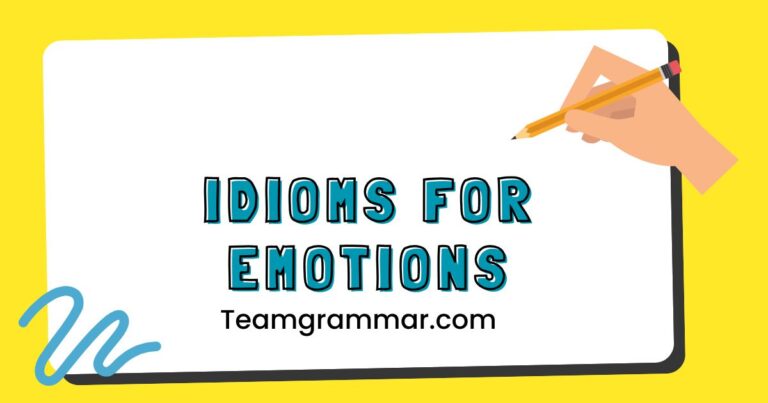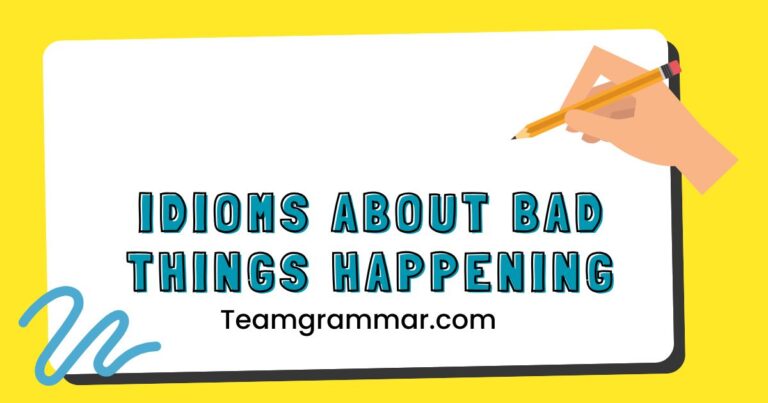45 Idioms for Quick: Mastering English Expressions of Speed
Idioms add color and depth to the English language, allowing for more expressive and nuanced communication. Understanding idioms related to speed, specifically those using the word “quick,” is essential for both native speakers and English language learners.
These idioms not only enhance comprehension but also enable more fluent and natural expression. This article provides a comprehensive guide to idioms for “quick,” exploring their meanings, origins, usage, and providing practical examples to help you master them.
Whether you’re preparing for an English exam, aiming to improve your conversational skills, or simply curious about the richness of the English language, this guide will equip you with the knowledge and tools to effectively use idioms for “quick.”
Table of Contents
- Introduction
- Definition of Idioms for “Quick”
- Structural Breakdown
- Types and Categories of Idioms for “Quick”
- Examples of Idioms for “Quick”
- Usage Rules
- Common Mistakes
- Practice Exercises
- Advanced Topics
- FAQ
- Conclusion
Definition of Idioms for “Quick”
An idiom is a phrase or expression whose meaning cannot be understood from the ordinary meanings of the words within it. Instead, the phrase has a figurative meaning known through common usage.
Idioms for “quick” are those that use the word “quick” or related concepts to convey a sense of speed, urgency, or efficiency. These idioms often paint a vivid picture and are more expressive than simple descriptions of speed.
They typically fall into the category of phrasal verbs, prepositional phrases, or fixed expressions. Understanding the context and cultural background is crucial for interpreting and using these idioms correctly.
The primary function of idioms for “quick” is to add emphasis and color to communication, making it more engaging and relatable. They are used in various contexts, from informal conversations to formal writing, although their appropriateness depends on the audience and purpose.
For example, “a quick fix” might be used in a casual conversation about a temporary solution, while “expeditiously” might be preferred in a formal report describing the efficient completion of a task. Mastering these idioms allows for a more nuanced and sophisticated understanding and use of the English language.
Structural Breakdown
Idioms, by their nature, often defy straightforward grammatical analysis. However, understanding the structural elements can aid in comprehension.
Many idioms for “quick” involve a combination of adjectives, nouns, and verbs, creating a phrase with a unique meaning. For instance, “quick as a flash” consists of an adjective (“quick”), a preposition (“as”), a noun (“flash”), and an article (“a”).
The entire phrase functions as an adverbial phrase, modifying a verb to describe how quickly something happens.
Another common structure involves phrasal verbs with “quick” or related words. For example, “to quicken” (meaning to accelerate or become faster) is a verb that can be used in various sentence structures.
The structure of an idiom often dictates its grammatical function within a sentence. Some idioms function as adjectives, adverbs, or even nouns.
Recognizing these structural patterns can help learners identify and understand new idioms more easily.
Types and Categories of Idioms for “Quick”
Idioms for “quick” can be categorized based on the aspect of speed they emphasize. These categories help in understanding the nuances and appropriate usage of each idiom.
Idioms Emphasizing Urgency
These idioms convey a sense of immediate action or importance. They often imply that something needs to be done without delay.
Idioms Describing Efficiency
These idioms highlight the ability to achieve results quickly and effectively, often with minimal effort or resources.
Idioms Highlighting Rapidity
These idioms focus on the speed at which something happens, emphasizing how fast an action is performed or an event occurs.
Examples of Idioms for “Quick”
The following sections provide detailed examples of idioms for “quick,” categorized by their emphasis on urgency, efficiency, or rapidity. Each example includes a definition and example sentence to illustrate its usage.
The tables below contain 20-30 examples for each category.
Examples Emphasizing Urgency
The following table presents idioms that emphasize the need for immediate action or importance. Each idiom is followed by its definition and a sentence demonstrating its use.
| Idiom | Definition | Example Sentence |
|---|---|---|
| Quick off the mark | Reacting or starting very quickly. | She was quick off the mark in answering the question, surprising everyone. |
| In a New York minute | Very quickly; almost instantly. | He said he’d be there in a New York minute. |
| At the drop of a hat | Immediately; without hesitation. | She’s ready to travel at the drop of a hat. |
| Posthaste | Immediately; without delay. | The message was sent posthaste to the headquarters. |
| Pronto | Quickly; immediately. | I need that report, pronto! |
| Snap to it | To start doing something quickly and with energy. | The coach told the team to snap to it if they wanted to win. |
| On the double | Very quickly; immediately. | Get down here on the double! |
| Sharpish | Quite quickly; rather soon. | I expect you back here sharpish. |
| Make short work of | To deal with something quickly and efficiently. | The team made short work of the project. |
| Like a shot | Very quickly; immediately. | He ran like a shot when he heard the news. |
| With all speed | As quickly as possible. | The ambulance arrived with all speed to the accident site. |
| On the spot | Immediately; without delay. | He fixed the problem on the spot. |
| Without delay | Immediately; without any waiting time. | The doctor attended to the emergency case without delay. |
| Expeditiously | Quickly and efficiently. | The matter was handled expeditiously by the committee. |
| Right away | Immediately; at once. | I’ll start working on that right away. |
| Instantly | Immediately; without any delay. | The effect was felt instantly. |
| Forthwith | Immediately; without delay. | The order was to be carried out forthwith. |
| In short order | Quickly; without much delay. | The repairs were completed in short order. |
| Double-time | Very quickly; at twice the normal speed. | The soldiers marched double-time to reach the destination. |
| At warp speed | Extremely quickly (often used humorously). | The project progressed at warp speed once the resources were allocated. |
| As soon as possible (ASAP) | As quickly as possible. | Please send me the documents as soon as possible. |
| In no time | Very quickly; in a short amount of time. | We’ll be there in no time. |
| In a flash | Very quickly; instantaneously. | The car disappeared in a flash. |
Examples Describing Efficiency
The following table presents idioms that describe the ability to achieve results quickly and effectively. Each idiom is followed by its definition and a sentence demonstrating its use.
| Idiom | Definition | Example Sentence |
|---|---|---|
| Quick fix | A temporary or makeshift solution. | The software update was just a quick fix, but it solved the problem for now. |
| Cut to the chase | To get to the point quickly, without wasting time. | Let’s cut to the chase and discuss the main issue. |
| In a nutshell | Briefly; in a concise manner. | In a nutshell, the project was a success. |
| Get it over with | To finish something quickly, especially if it is unpleasant. | I just want to get it over with so I can relax. |
| Make haste slowly | To proceed quickly but carefully. | We should make haste slowly to avoid mistakes. |
| Fast track | To accelerate the progress of something. | The company decided to fast track the development of the new product. |
| Swiftly | Quickly and efficiently. | The company swiftly addressed the customer’s complaint. |
| Expedite | To speed up the process. | We need to expedite the shipment to meet the deadline. |
| Streamline | To make something more efficient. | The company is trying to streamline its operations. |
| Under wraps | Kept secret or hidden until the appropriate time. | The project was kept under wraps until the official announcement. |
| Get down to business | To start doing something seriously and efficiently. | Let’s get down to business and start planning the event. |
| Efficiently | In a way that achieves maximum productivity with minimum wasted effort or expense. | The team worked efficiently to complete the project on time. |
| Without further ado | Without any more delay. | Without further ado, let’s begin the meeting. |
| Like greased lightning | Extremely fast and efficient. | He completed the task like greased lightning. |
| In double-quick time | Very quickly and efficiently. | She finished the report in double-quick time. |
| Cut corners | To do something poorly in order to save time or money. (Often implies a negative connotation, but can sometimes refer to efficiency if the quality does not suffer) | They had to cut corners to finish the project on time. |
| Get the ball rolling | To start something; to get things moving. | Let’s get the ball rolling by assigning tasks to everyone. |
| Make headway | To make progress. | We’re starting to make headway on the project. |
| On track | Making progress as planned. | The project is on track to be completed by the deadline. |
| One-stop shop | A place where you can find everything you need in one location, making it efficient. | This website is a one-stop shop for all your needs. |
| The express lane | A quicker way to achieve something. | Taking this course is the express lane to mastering the topic. |
| Operate at full tilt | To operate at maximum speed or efficiency. | The factory was operating at full tilt to meet the demand. |
Examples Highlighting Rapidity
The following table presents idioms that emphasize the speed at which something happens. Each idiom is followed by its definition and a sentence demonstrating its use.
| Idiom | Definition | Example Sentence |
|---|---|---|
| Quick as a flash | Extremely fast. | The cheetah ran quick as a flash. |
| Like a bat out of hell | Very quickly and recklessly. | He drove like a bat out of hell to get to the hospital. |
| In the blink of an eye | Very quickly; almost instantaneously. | The opportunity disappeared in the blink of an eye. |
| At breakneck speed | Very fast and dangerous. | They were driving at breakneck speed down the highway. |
| Faster than a speeding bullet | Extremely fast (often used humorously). | He was faster than a speeding bullet when he ran to catch the bus. |
| In a heartbeat | Immediately; without hesitation. | I would help you in a heartbeat. |
| Like the wind | Very fast. | She ran like the wind to reach the finish line. |
| With lightning speed | Extremely quickly. | The news spread with lightning speed. |
| As quick as lightning | Very fast. | Her reflexes were as quick as lightning. |
| At full throttle | At maximum speed or intensity. | The engine was running at full throttle. |
| In record time | Faster than ever before. | The project was completed in record time. |
| Like a rocket | Very fast. | The car accelerated like a rocket. |
| In a jiffy | Very quickly; in a short amount of time. | I’ll be there in a jiffy. |
| As fast as you can say Jack Robinson | Very quickly; in a moment. | He disappeared as fast as you can say Jack Robinson. |
| Like a flash of lightning | Extremely quickly. | The idea came to her like a flash of lightning. |
| In two shakes of a lamb’s tail | Very quickly; in a short time. | I’ll fix it in two shakes of a lamb’s tail. |
| Before you know it | Very soon; quickly. | Before you know it, summer will be here. |
| At a rate of knots | Very quickly (originally a nautical term). | The boat was traveling at a rate of knots. |
| In nothing flat | Very quickly; in no time at all. | We’ll have it finished in nothing flat. |
| Like nobody’s business | Very quickly or enthusiastically. | He was eating like nobody’s business. |
| Like wildfire | Spreading very rapidly. | The rumor spread like wildfire. |
| Fleet-footed | Moving quickly; nimble. | The fleet-footed runner won the race. |
Usage Rules
Using idioms correctly requires understanding their specific meanings and contexts. While many idioms for “quick” are interchangeable, some are more appropriate in certain situations than others.
For example, “posthaste” is more formal than “right away.” Similarly, “like a bat out of hell” implies recklessness, while “expeditiously” suggests efficiency and professionalism. Consider the audience and the tone of your communication when choosing an idiom.
It’s also important to be aware of the grammatical function of each idiom. Some idioms are adverbial phrases that modify verbs, while others are adjectives or nouns.
Ensure that the idiom fits grammatically within the sentence. Pay attention to prepositions and articles within the idiom, as these are often fixed and cannot be changed.
Overusing idioms can also make your language sound unnatural or forced. Use them sparingly and purposefully to enhance your communication, not to overwhelm it.
Common Mistakes
One of the most common mistakes is misinterpreting the meaning of an idiom. Since idioms have figurative meanings, it’s essential to learn their definitions and usage through examples.
Another common error is using an idiom in the wrong context. For example, using a formal idiom in a casual conversation can sound awkward.
Additionally, non-native speakers sometimes make mistakes with the grammatical structure of idioms, such as changing prepositions or articles.
Here are some examples of common mistakes and their corrections:
| Incorrect | Correct | Explanation |
|---|---|---|
| He did it quick as the flash. | He did it as quick as a flash. | The correct idiom includes the word “as.” |
| I need that report post haste. | I need that report posthaste. | “Posthaste” is one word. |
| Let’s cut the chase to the point. | Let’s cut to the chase. | The correct idiom is “cut to the chase.” |
| They finished the project in record time quickly. | They finished the project in record time. | “In record time” already implies quickly. |
| She’s ready to travel at the drop from a hat. | She’s ready to travel at the drop of a hat. | The correct idiom uses “of.” |
Practice Exercises
Test your understanding of idioms for “quick” with the following exercises. Choose the correct idiom to complete each sentence.
- The firefighters arrived __________ to put out the fire.
- at the drop of a hat
- on the double
- in a nutshell
- Let’s __________ and start the meeting.
- make haste slowly
- cut to the chase
- like nobody’s business
- The news spread __________ through the town.
- like wildfire
- in a jiffy
- posthaste
- He finished the race __________.
- at breakneck speed
- under wraps
- with all speed
- I’ll be there __________.
- in a New York minute
- expeditiously
- on track
- She answered the question __________
- quick off the mark
- in short order
- at warp speed
- We need to get this done __________.
- posthaste
- streamline
- sharpish
- He ran __________ when he heard the bell.
- like a shot
- with all speed
- double-time
- The matter was handled __________.
- expeditiously
- right away
- forthwith
- The car disappeared __________.
- in a flash
- in no time
- as soon as possible
Answer Key:
- b
- b
- a
- a
- a
- a
- a
- a
- a
- a
Exercise 2: Fill in the blank with a suitable idiom from the list: quick fix, get it over with, fast track, swiftly, expedite, like greased lightning, cut corners, get the ball rolling, make headway, on track
- The company wants to __________ the project to meet the deadline.
- Let’s __________ by assigning tasks to team members.
- We need a __________ to solve this problem temporarily.
- The team worked __________ to complete the project ahead of schedule.
- We are starting to __________ on the research project.
- They completed the task __________.
- The project is __________ to be finished by next month.
- I just want to __________ so I can relax.
- We need to __________ the shipment to ensure it arrives on time.
- They had to __________ to finish the job on time.
Answer Key:
- fast track
- get the ball rolling
- quick fix
- swiftly
- make headway
- like greased lightning
- on track
- get it over with
- expedite
- cut corners
Advanced Topics
For advanced learners, exploring the etymology and historical context of idioms for “quick” can provide a deeper understanding of their meanings and usage. Many idioms have origins in specific historical events, cultural practices, or literary works.
Understanding these origins can shed light on the nuances of their meanings. For example, “at a rate of knots” comes from nautical terminology, referring to the speed of a ship measured in knots.
Additionally, idioms can evolve over time, with their meanings and usage changing to reflect contemporary culture. Studying these changes can provide insights into the dynamic nature of language.
Another advanced topic is the use of idioms in different dialects and regional variations of English. While many idioms are widely understood, some are specific to certain regions or communities.
Being aware of these variations can help you avoid misunderstandings and communicate more effectively with diverse audiences. Furthermore, exploring the use of idioms in literature and media can enhance your appreciation of their artistic and expressive potential.
Authors and filmmakers often use idioms to add depth, humor, and authenticity to their work.
FAQ
- What is an idiom?
An idiom is a phrase or expression whose meaning cannot be understood from the ordinary meanings of the words within it. Instead, the phrase has a figurative meaning known through common usage.
- Why is it important to learn idioms?
Learning idioms enhances your understanding of the English language, allows for more expressive communication, and helps you sound more natural when speaking or writing.
- How can I learn new idioms?
Read extensively, listen to native speakers, use flashcards, and practice using idioms in your own conversations and writing.
- Are idioms used in formal writing?
Some idioms are appropriate for formal writing, while others are more suitable for informal contexts. Choose idioms that match the tone and audience of your writing.
- Can I change the words in an idiom?
No, idioms are fixed expressions and should not be altered. Changing the words can change the meaning or make the idiom nonsensical.
- What should I do if I don’t understand an idiom?
Look up the idiom in a dictionary or online resource, ask a native speaker for clarification, or try to understand the meaning from the context.
- Are idioms the same in all English-speaking countries?
No, some idioms are specific to certain regions or countries. Be aware of regional variations and use idioms that are appropriate for your audience.
- How can I avoid misusing idioms?
Study the meanings and usage of idioms carefully, practice using them in context, and ask for feedback from native speakers.
- What is the difference between an idiom and a proverb?
An idiom is a phrase with a figurative meaning, while a proverb is a short, well-known saying that expresses a general truth or piece of advice. Proverbs often have a moral or practical message.
- How do I know if an expression is an idiom or just a literal phrase?
If the meaning of the phrase is different from the literal meanings of the individual words, it is likely an idiom. Context is also important; idioms often have a specific cultural or historical background.
- Are there online resources for learning idioms?
Yes, there are many online dictionaries, websites, and apps that provide definitions, examples, and practice exercises for learning idioms. Some popular resources include the Cambridge Dictionary, Merriam-Webster, and specialized idiom dictionaries.
Conclusion
Mastering idioms for “quick” is an invaluable step in achieving fluency and nuance in English. By understanding their meanings, structures, and usage rules, learners can communicate more effectively and expressively.
This article has provided a comprehensive overview of idioms for “quick,” including examples, practice exercises, and advanced topics to enhance your learning. Remember to practice regularly and pay attention to context to use these idioms correctly and confidently.
Incorporating these idioms into your vocabulary will not only enrich your language skills but also provide a deeper appreciation for the richness and complexity of the English language.
Continue to explore and practice using these idioms in various contexts to solidify your understanding. Pay attention to how native speakers use them in conversations, books, and movies.
With consistent effort and practice, you’ll be able to use idioms for “quick” fluently and naturally, adding color and depth to your communication. Embrace the challenge and enjoy the journey of mastering these fascinating expressions.







